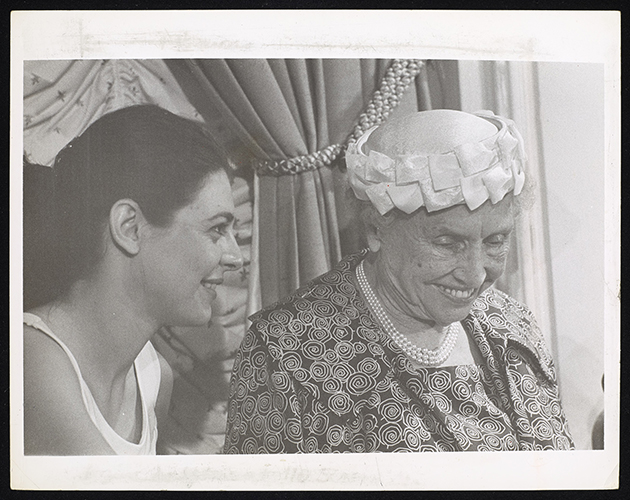
I thought I knew what I would find when I started my tenure as the Metadata Specialist for the digitization project of the Helen Keller Archive.
Helen Keller worked for the American Foundation for the Blind for more than 40 years. She was born in Tuscumbia, Alabama, on June 27, 1880, and became deaf and blind at 19 months. Few could have imagined the leading role she would go on to play in many of the significant political, social, and cultural movements of the 20th century. Until her passing in 1968, she worked unceasingly to improve the lives of people with disabilities. As caretakers of Helen Keller's archival collection and legacy, we are honored to share her history with you. Learn more about Helen Keller by exploring her letters, speeches, artifacts, and photographs in the Helen Keller Archive.

I thought I knew what I would find when I started my tenure as the Metadata Specialist for the digitization project of the Helen Keller Archive.
Helen Keller seated and reading a book in braille, Westport, CT, 1960.
Head and shoulders image of Helen Keller taken at her 80th birthday in 1960.
Helen Keller died 50 years ago today – just a few weeks short of her 88th birthday. As the archivist and caretaker of her collection, I initially wondered how I nearly overlooked this anniversary. Upon consideration, I have several theories about this that I’d like to share with you.
Thursday, May 17, marks the seventh Global Accessibility Awareness Day (GAAD), the purpose of which is to get everyone talking, thinking, and learning about digital access/inclusion and people with different disabilities.
"...Let us not forget the treasures which the swift years have laid at our feet—the strength, the sense, the courage to meet difficulties and overcome them. Nothing else matters very much. To keep on trying in spite of disappointment and failure is the only way to keep young and brave. Failures become victories if they make us wise-hearted."
-Helen Keller, in a 1921 speech she gave at the reunion dinner for Wright-Humason School, sharing memories of past classmates and her time spent at the school
"What do I consider a teacher should be? One who breathes life into knowledge so that it takes new form in progress and civilization."
- Helen Keller in a speech to the National Education Association, 1938